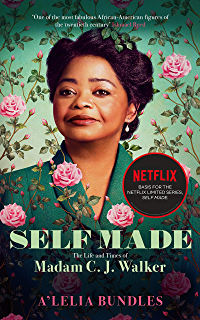“Self Made” Netflix Show Review
May 1, 2020

Over the past few weeks, major changes have occurred in our nation and in our world. Our fast moving world has been put on pause due to the massive spread of the Coronavirus.
People across the globe have been ordered to stay at home for an unknown, extended period of time. The term social distancing is now something we cannot let a day go by without hearing.
During this period of social distancing, many people have turned to social media platforms and entertainment services. According to a New York Times article about internet traffic impacting the world’s internet speed, “the use of YouTube, Netflix, Zoom video conferencing, Facebook calls and video gaming has surged to new highs, the stress on internet infrastructure is starting to show in Europe and the United States”.
I, myself, have turned to Netflix. In the last few weeks, the company has released new episodes and additional movies and shows. One of those shows was a four-part series on the life of Madam CJ Walker titled “Self-made”. It immediately caught my eye because I did not know the whole story of her contribution to black history. I was very excited when I found out that her story would now be shared with millions.
“Self Made” was released on March 20, 2020. The mini-series was directed and produced by several widely known people such as Lebron James and Octavia Spencer. Spencer also played the role of Madam CJ Walker. Several other popular actors such as Tiffany Haddish, Blair Underwood, Carmen Ejogo, and Garrett Morris, played significant roles in the series as well.
In the story, Sarah Walker, Madam CJ Walker’s real name, faces several challenges and a long-standing rivalry while trying to promote and improve black female hair products. She manages to become one of the first African-American and female billionaires through her successful hair business. Madam CJ Walker’s legacy opened up a new door for not only black women but also black businesses and female entrepreneurship.
After watching the series, I noticed that there were a multitude of themes that were shown that our society is still dealing with to this day.
One major theme was colorism.
By definition, colorism is “a form of racial discrimination based on the shade of an individual’s skin tone, typically favoring lighter skin.” Throughout each episode, the society around Sarah emphasizes their favoritism for lighter skinned women. As a darker skinned female, she was often shot down by her rival and had to work harder to sell her hair products.
Today, our society still deals with colorism but not only in African-American communities. Colorism can happen within any race or ethnicity world wide. “Self Made” brought this problem to light because it is not typically a theme that is portrayed on television.
Another theme that the series highlights is female independence.
Sarah was alive from 1867 to 1919. During that era, women were normally seen in the kitchen or as a housewife. However, Sarah clearly defied that role when deciding to start her own hair business by herself. Over time, she became the main “breadwinner” of her family. Although her husband was supportive in the beginning, he eventually disliked the fact that she now carried the societal role of the man. The series really demonstrates how unique and strong Walker was given her environment.
It has been many years since the Women Rights Movement and women are continuously growing in their independence and entrepreneurship. According to a 2012 Forbes article by Natalie MacNeil, “Women have been starting businesses at a higher rate than men for the last 20 years and tend to create home-based micro (less than 5 employees) and small businesses.” The series “Self Made”shows the early leaders of the modern day woman.
In conclusion, I really liked the mini TV-series. I thought that it was well thought out and well cast. I enjoyed the fact that I learned about somebody who has had a direct impact on my life and appearance. I hope to see more movies about unpopular stories come into the spotlight more often.



